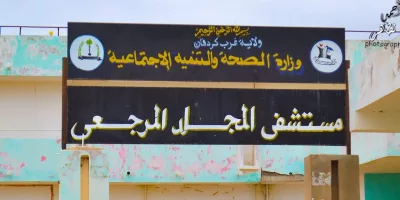During its session on Monday, March 4, 2024, the The First Circuit (Terrorism) of the Egyptian Criminal Court sentenced 8 leaders of the Egyptian opposition, most of them from the Muslim Brotherhood, to death by hanging and sentenced 37 others to life imprisonment. Additionally, it handed down 15 years of rigorous imprisonment for 6 defendants, 10 years for 7 others, and acquitted 21 defendants.
The court was held at the Badr Courts Complex within the Badr Prison Compound, chaired by Judge Mohamed El-Saeed El-Sharbini, with the membership of Judges Essam Abu Al-Ala, Gharib Mohamed Metwally, Mahmoud Zidan, and Mohamed Nabil, pronounced verdicts in the case of the killing of Sharif El-Sabai, a police officer from the Central Security Forces, and others during the violence at Al-Azhar and the Manassa in Nasr City. The case is numbered 72/2021 State Security Emergency Second Nasr City, registered as number 9/2021 Cairo New City, and known in the media as the “Manassa Events.”
The Committee for Justice (CFJ) condemns the mass death sentences issued in that case due to their issuance by an abnormal judge and an exceptional court. The committee calls for the retrial of the defendants before a regular judge in a trial that adheres to internationally recognized standards of a fair trial. It demands the cessation of both the attended and absentia sentences, along with the release of the accused.
The names of the people sentenced to death are as follows:
- Mohamed Badi Abdel Mageed Mohamed Sami (70 years old), a full-time professor at the Faculty of Veterinary Medicine, Beni Suef University (detained).
- Mahmoud Ezzat Ibrahim Ibrahim (69 years old), a full-time professor at the Faculty of Medicine, Zagazig University (detained).
- Mohamed Mohamed Ibrahim El-Beltagy (50 years old), an assistant professor at the Faculty of Medicine, Al-Azhar University (detained).
- Amr Mohamed Zaki Mohamed (47 years old), an architect (detained).
- Osama Youssef Abdel Wahab Mohamed (49 years old), a doctor (detained).
- Safwat Hamouda Hegazi Ramadan (61 years old), Chairman of the Board of the Arab Company for Satellite Channels (detained).
- Assem Abdel Majeed Mohamed Madi (55 years old), a Bachelor of Engineering (in absentia).
- Mohamed Abdel Maqsoud Afifi (66 years old), a retired professor, head of the Department of Plant Protection Research (in absentia).
The Supreme State Security Prosecution referred the case to the State Security Criminal Court in April 2021. The first terrorism circuit held the initial session on June 6, 2021, at the Tora Courts Complex. Subsequently, the trial was transferred to the complex at the request of the Appeals Prosecutor of the Wadi El Natrun 2 Reform and Rehabilitation Center in Badr City. Over consecutive sessions, the court is conducting the trial of the defendants.
The recurrent issuance of mass death sentences by Egyptian terrorism courts has consistently faced sharp international criticism. Notable among these criticisms was the warning issued by the then United Nations Commissioner for Human Rights, Michelle Bachelet, in 2018. She warned the Egyptian authorities against executing death sentences for 72 defendants in the Rabaa Dispersal case, asserting that it would be a “miscarriage of justice irreparable” due to an “unfair trial.” Bachelet urged the Egyptian Court of Cassation to annul the mass death sentences, highlighting that the defendants were deprived of their right to have private lawyers and present evidence, while the prosecution failed to provide sufficient evidence for each individual’s alleged crime.
Egypt’s counter-terrorism laws have also faced criticism from international bodies for causing further erosion of basic human rights. They have led to arbitrary detentions, torture allegations, and broader suppression of freedom of expression, thought, association, and peaceful assembly in the country. Amid international calls for a review of these laws and a reconsideration of vague judgments that “will seriously impact a range of fundamental human rights,” as stated by the UN Special Rapporteur on human rights and counter-terrorism, Fionnuala Ní Aoláin.
CFJ asserts that all these criticisms have not deterred the Egyptian authorities. They note the execution of 105 death sentences in 23 cases from 2015 to 2022, with executions distributed as follows:
In 2015, 7 death sentences were executed.
In 2016, only one death sentence was executed.
In 2017, 15 death sentences were executed.
In 2018, 14 death sentences were executed.
In 2019, 18 death sentences were executed.
In 2020, 25 death sentences were executed.
In 2021, 18 death sentences were executed.
In 2022, 7 death sentences were executed, with approximately 100 defendants still awaiting execution, as their death sentences have become legally enforceable.
CFJ urges Egypt to consider the international requests calling for the abolition of the death penalty and its replacement with alternative lighter penalties. It calls on the international community and international bodies monitoring the situation in Egypt to exert pressure on the authorities there to halt political executions. It emphasizes the ongoing loss of lives and the necessity of providing avenues for redress for the families of those accused who have faced execution based on such trials.
Furthermore, the committee encourages Egyptian authorities to review the arsenal of counter-terrorism laws, assessing their compatibility with the international covenants and treaties signed by Egypt. This, according to the committee, is a crucial first step towards rectifying the situation and putting an end to the continuous stream of violations against individuals accused of terrorism in Egypt.






